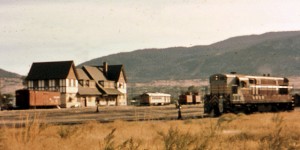Renne Jin
Summary
Jassy was born in New Westminster ninety-six and a half years ago. Since the moment she was born, Jassy has lived in New Westminster, a nice, quiet, and friendly place that she likes. She has four children and a granddaughter who is teaching grade eleven physics and math in an international school in south China. Her other granddaughter, who is younger, is here in New Westminster, and her grandson is a machinist.
Childhood

Old Kettle Valley Line
Credit: Mark Faviell
As an innocent kid around seven years old, Jassy used to stay with her cousin, who was living close to the Kettle Valley Line, three years in a row. Her uncle, Max, helped with the construction of the railway line, which was actually a subsidiary of the Canadian Pacific Railway. The route was named after a novel of Shakespeare because the engineer as the supervisor was a big fan of Shakespeare. There were a lot of tunnels along the whole route whose core portion started in Hope and terminated in Midway. Together with another sister, Jassy and her cousin, Jessica, had a lot of adventures there. Once they even witnessed a mother bear and her cub standing still not very far from them, which was a quite scary experience for them. The three girls would also go and pick small wild strawberries that grew right on the ground and were easy for small kids to reach. These natural fruits tasted sweet and could be used to make strawberry jam. Somewhere in the mountain area, there existed many big steps with ordinary ones on the side on which one could walk up. For little Jassy, it was very difficult to deal with those steps with large spans in vertical direction; they also left a deep impression on her. The girls also got the chance to ride a speeder on the railway track by pumping a handle up and down to keep it moving.
Work
When she was around twenty, Jassy worked as a worker at the Canadian Forest Product during the Second World War. Her job was to manufacture plywood, which she considered quite interesting. There were about two thousand employees in total who were working for the factory. Plywood was manufactured in a long assembly line, therefore different workers were assigned different tasks to complete. The raw materials, which were pieces of wood, got packed and stuck together using glue. Finished plywood was shipped to an aircraft factory to be used to manufacture Mosquito planes, which were preferred by a lot of pilots. It was also in her factory that Jassy met her future husband, who was a worker as well. Her husband always sent her jewelry and perfumes as presents, which meant a lot for Jassy.
Deepest impression
In Jassy’s memory, one event that left the deepest impression on her was getting married and having her own family, which was a big deal in her life. She also considered marriage as life-altering, because that was when she had to get used to not being single anymore and had to raise a family with her partner. When she first got married, Jassy told her husband that she would like to have six children, and he responded that he would do his best. They eventually ended up with four, a number that Jassy considered to be enough for them.
Life changing event
The most dramatic and largest change in life for Jassy was the death of her husband when they were on vacation. It is not hard to imagine that she was really shocked at that time. Fortunately, Jassy’s daughter, who was twenty-one, was with her when the tragedy happened. Since then, Jassy’s life changed a lot. She lost touch with a large group of people who were perhaps much more close to her husband than she was. However, she still kept on working because the money her husband left for her was not enough for the whole family. Jassy used to live in a big house with a basement, bedrooms on the first floor, and toilets upstairs. It was quite inconvenient to go to toilet because she had to first go upstairs and then downstairs back. After repeating this process only by herself for a long time, Jassy realized one day that she could get herself a better place to live in. Therefore she sold her old house and came to her new apartment where she has been living up till now. The apartment is also Jassy’s favourite place because it is right across the Century House and could not be more convenient. All the rooms are on one floor and there is an elevator that carries people to high floors. Bus stops and parks are also quite close to the building. Since Jassy likes green, those conditions are quite ideal for her and she is now enjoying her life after retirement.
Life after retirement
Since her retirement, Jassy has always felt that she belonged to Century House. She volunteers and does light exercises which are good to her health. Her life is very rich and colorful every day. Jassy has lots of personal interests such as hiking, playing sports, and making her own clothes. She used to go to different places like the North Shore to hike with friends on Fridays and Saturdays when she were still capable of hiking. Because of the pain in her knees, she had to give up this main interest a few years ago. She also played golf and tennis, roller skated, and went swimming when she was younger. As her circulation system gets worse when her age increases, Jassy has had to give up more and more sports that she is quite interested in. However, she is still quite active. She enjoys walking and used to walk two miles decades ago. She is also willing to make clothes not only for herself, but for her kids and grandchildren, though many of them would prefer buying them from a store directly.
Closing
Jassy likes to travel in Canada, USA, and Europe. When she was capable of, she did travel and had been to a lot of countries. Her footprints can be found in France, Italy, and other European countries. She also took bus tours in different states in the USA. Nevertheless, Jassy has never been to Asia before. She learned something about China by exchanging letters with her granddaughter, who writes letters in Chinese while Jassy replies in English. When Jassy was young eighty years ago, she was so busy and did not get much time to travel; now she has plenty of free time, but her body cannot afford long journeys any more. She would like to suggest that young people should start to do the things they want to do right now, like traveling or other interests, and not to wait until there is plenty of time for them to do so.
